

7 Ways an Anxiety Support Animal Enhances Your Well-Being
by Lena Park
Last updated: July 10, 2025
Verified and Approved by:
Angela Morris,
MSW, LCSW
Fact Checked

Overview
Anxiety can be a heavy burden, often leaving individuals feeling isolated and overwhelmed. However, an anxiety support animal can enhance well-being by providing emotional stability, companionship, and therapeutic benefits that help alleviate anxiety symptoms and reduce feelings of loneliness.
Research reveals that a significant majority of ESA caretakers report positive effects on their mental health, highlighting the transformative role these animals play in managing anxiety and improving overall quality of life. It’s heartening to know that many find solace and support through the unconditional love of their furry companions.
If you’re navigating these emotional challenges, consider how an ESA might bring comfort and connection into your life.
Introduction
Anxiety support animals have emerged as vital companions for individuals navigating the complexities of mental health challenges. These beloved animals not only provide emotional comfort but also contribute significantly to overall well-being.
With a staggering 88% of ESA guardians reporting positive effects on their mental health, the transformative power of these animals is undeniable. Yet, many still grapple with misconceptions and a lack of awareness about their rights and the benefits of having an emotional support animal.
How can understanding these aspects enhance the lives of those struggling with anxiety? This article explores the multifaceted advantages of anxiety support animals, shedding light on their role in improving mental health and the essential steps to secure one.
Wellness Wag: Quick Access to Emotional Support Animal Letters
At Wellness Wag, we understand the emotional challenges faced by individuals seeking an anxiety support animal to help with their mental health. The journey to obtaining an anxiety support animal letter can feel overwhelming, but we’re here to help. Our streamlined, user-friendly platform begins with a brief assessment to determine eligibility, followed by a compassionate consultation with licensed medical professionals who genuinely care about your needs. Once approved, you can expect to receive your official ESA letter within 24 hours, allowing you to swiftly access essential housing and travel accommodations.
For those in states with specific regulations, such as Arkansas, California, Iowa, Louisiana, and Montana, we want to ensure you are informed that delivery may take up to 30 days as required by law. This transparency is part of our commitment to supporting you every step of the way. Upon placing your order, you will receive a confirmation email detailing your purchase, providing peace of mind during this process.
We recognize how crucial this rapid turnaround is for those requiring immediate support, particularly when it comes to obtaining an anxiety support animal, highlighting the urgency of accessing timely mental health resources. Research shows that 85% of ESA caretakers report a positive mental impact, reinforcing the importance of quick access to these essential letters. With over 50,000 patients assisted, Wellness Wag demonstrates how a proficient online platform can successfully address the immediate needs of individuals seeking an anxiety support animal. Remember, you are not alone in this journey, and we are here to provide the compassionate assistance you deserve.
Improved Mental Health: How Emotional Support Animals Alleviate Anxiety
Anxiety support animals, such as Emotional Support Animals (ESAs), play a crucial role in alleviating anxiety symptoms, fostering a calming environment that significantly reduces stress levels. Have you ever felt overwhelmed by anxiety, wishing for a source of comfort? Research has shown that interacting with animals can lead to lower blood pressure and heart rate—vital indicators of overall well-being.
For individuals grappling with anxiety disorders, having an anxiety support animal provides a profound sense of security and stability, transforming daily challenges into more manageable experiences. It’s heartening to know that:
- 88% of animal caregivers acknowledge the stress-relieving impacts of their companions, highlighting the psychological advantages of animal companionship.
- Individuals with secure attachments to their animals report 25% lower anxiety levels compared to those without such connections.
This underscores the significance of ESAs in enhancing mental health and emotional resilience. Remember, you are not alone in this journey; the support of an anxiety support animal can provide a nurturing solution to help you navigate through tough times.
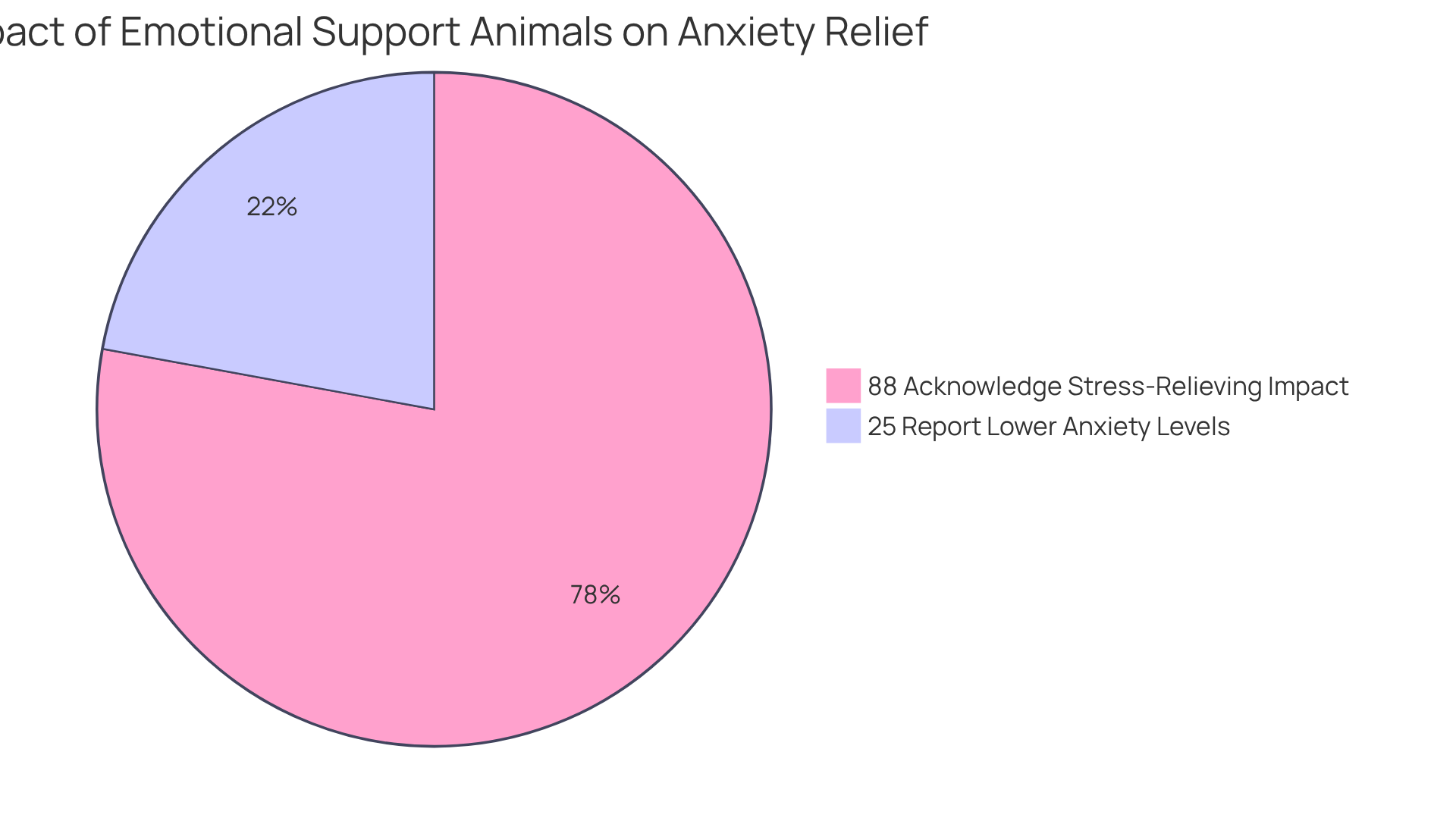
Legal Protections: Rights of Emotional Support Animal Owners
For individuals facing emotional challenges, the presence of an anxiety support animal can be a source of comfort and stability. These beloved companions, which are considered anxiety support animals, not only provide emotional support but also come with important legal protections under the Fair Housing Act (FHA) and the Air Carrier Access Act (ACAA). These laws empower those with valid ESA letters to live with their animals in housing that typically prohibits pets, and to travel with them on airlines.
Understanding these rights is crucial for ESA holders, as it helps prevent discrimination and secures necessary accommodations. It’s concerning that, despite 18% of pet caregivers in the U.S. reporting they have an ESA, many remain unaware of their legal rights. This lack of awareness can lead to significant challenges when advocating for their needs. Recent data reveals a troubling rise in discrimination cases involving ESA handlers, underscoring the importance of being informed about one’s rights.
By familiarizing themselves with these protections, ESA custodians can effectively advocate for their rights, ensuring they receive the support they need in both housing and travel situations. If you ever find yourself facing discrimination, remember that you are not alone. It is advisable for ESA caretakers to seek assistance from organizations or legal professionals. They can provide the support you need to navigate these challenges, ensuring that your emotional well-being is prioritized and protected.
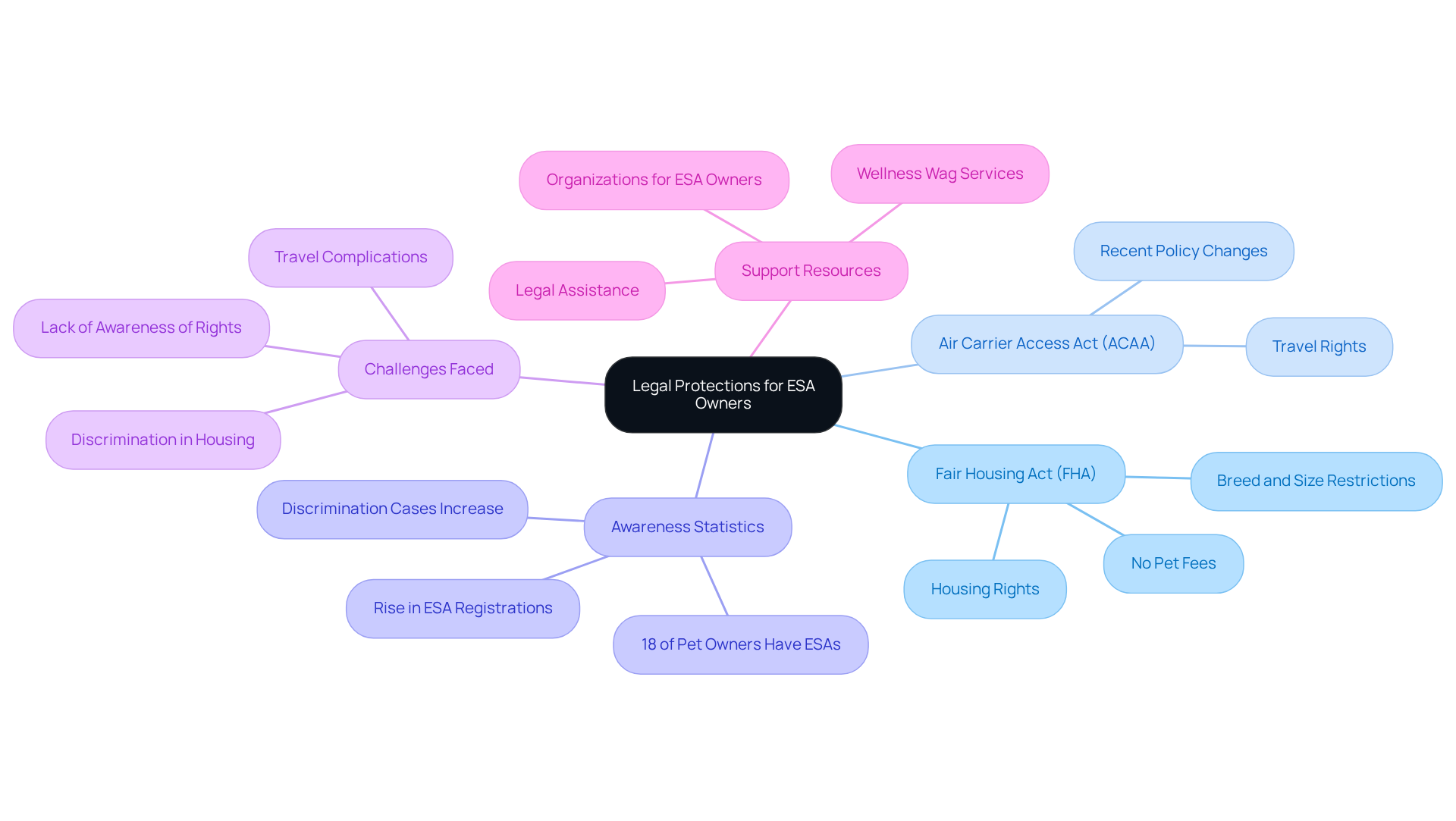
Companionship: Reducing Loneliness with an Emotional Support Animal
The companionship offered by an Emotional Support Animal (ESA) stands out as one of its most profound benefits, especially for those grappling with social isolation or living alone. Imagine the warmth of an ESA’s presence, which can significantly ease feelings of loneliness, nurturing a sense of belonging and psychological connection that is essential for mental health.
Research indicates that:
- 74% of pet guardians experience enhanced mental well-being due to their pets, highlighting the emotional advantages of having animals in their lives.
- Individuals who share secure attachments with their pets report 25% lower anxiety levels compared to those without such bonds, illustrating the vital role these relationships play.
- In a world where about 33% of the population faces loneliness regularly, and 52% of Americans express feelings of loneliness, the unconditional love and companionship provided by an ESA not only enrich lives but also pave the way for a more fulfilling and joyful existence.
- Additionally, 88% of ESA guardians acknowledge a positive impact on their mental health from their animals, reinforcing the effectiveness of ESAs in enhancing psychological well-being.
Have you ever considered how an ESA could transform your life? The support they provide can be truly life-changing.
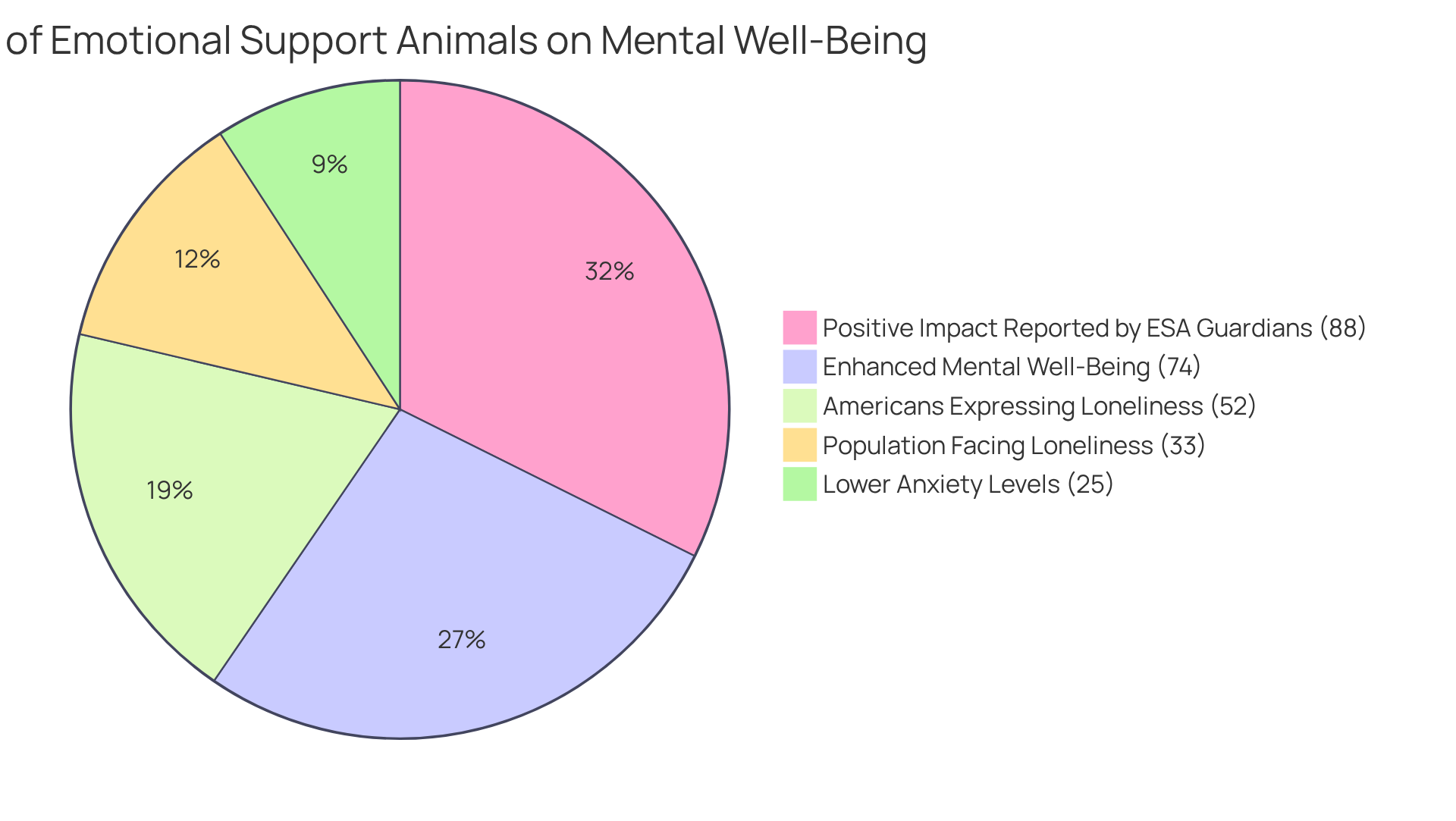
Therapeutic Tasks: How Emotional Support Animals Help Manage Anxiety
Anxiety support animals, such as Emotional Support Animals (ESAs), play a vital role in helping individuals manage anxiety through a variety of therapeutic tasks. They provide comfort during panic attacks, encouraging a sense of safety and stability. Engaging in physical activities, such as walking with an ESA, not only promotes exercise but also fosters a routine that can alleviate anxiety symptoms. The calming presence of an ESA during stressful situations can significantly reduce feelings of overwhelm.
Have you ever felt that overwhelming wave of anxiety wash over you? Research indicates that the simple act of petting an animal triggers the release of endorphins, which elevate mood and diminish anxiety levels. A study found that interactions with animals can lower cortisol levels, a hormone associated with stress, while simultaneously boosting oxytocin, known for its calming effects. This physiological response underscores the importance of ESAs in enhancing emotional well-being.
For instance, children with autism spectrum disorder have shown reduced anxiety and improved social interactions when engaging with therapy animals, highlighting the therapeutic benefits of animal companionship. Furthermore, studies indicate that:
- 88% of ESA caregivers report a positive effect on their mental health.
- 69% of pet caregivers mention assistance in alleviating stress and anxiety as a significant advantage of having pets.
This further emphasizes the integral role that anxiety support animals play in managing anxiety.
Moreover, ESAs are permitted in university housing, promoting equal opportunity for students with disabilities to fully enjoy residential life. It is essential for ESA guardians to understand their rights and responsibilities in this context, including any specific guidelines that may apply to their presence in housing. However, it’s important to recognize that ESA guardians often encounter challenges such as housing restrictions and travel difficulties. If you are struggling with anxiety, considering the adoption of an anxiety support animal could provide significant emotional support and companionship.
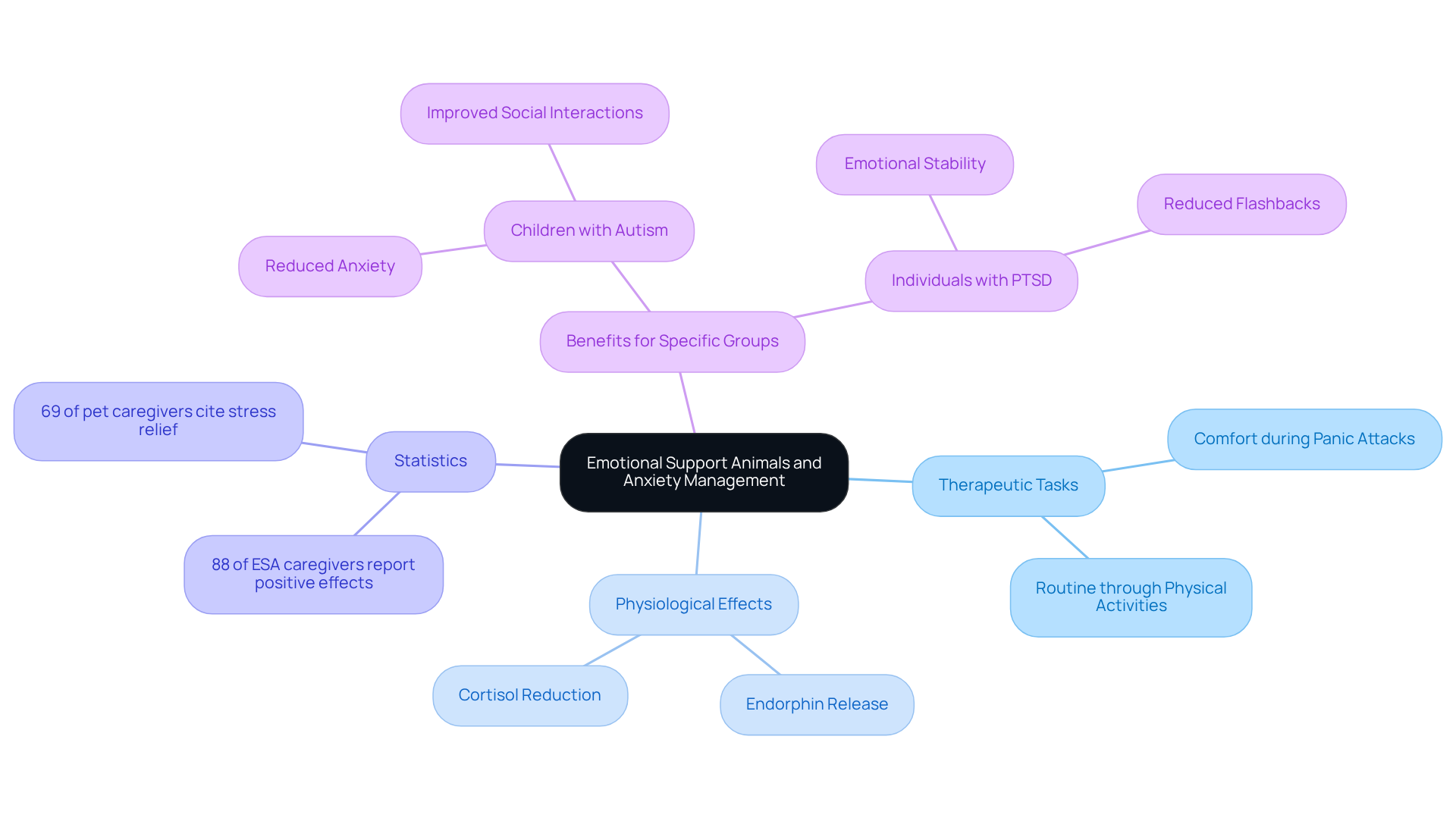
Financial Security: The Role of Pet Insurance for Emotional Support Animals
Pet insurance plays a vital role in ensuring the financial stability of guardians of Emotional Support Animals (ESAs). While ESAs do not require specialized training, the costs associated with their care—veterinary services, food, and other essentials—can be significant. In 2024, the average yearly expense for a pet dog reached approximately $1,400, while cat owners spent around $1,150. These figures underscore the financial commitment involved in caring for an ESA.
Imagine the stress of unexpected medical expenses, such as surgeries or emergency vet visits, which can average $3,500 for dogs and $3,400 for cats. Common medical conditions, like urinary tract infections, can lead to vet bills averaging $1,000. This financial safety net offered by pet insurance allows ESA caretakers to focus on the emotional benefits their companions provide, alleviating the anxiety of potential veterinary costs for those who have an anxiety support animal.
Financial advisors often recommend pet insurance as a wise investment for ESA caregivers. The pet insurance market is projected to grow at a remarkable 20.98% CAGR by 2030, reaching an estimated $15.71 billion. Additionally, the number of insured pets in the U.S. is expected to rise by 17.1% in 2024, reflecting a growing recognition of the importance of pet health and well-being. By investing in pet insurance, ESA guardians can ensure their beloved anxiety support animal receives the essential care it needs, enhancing both its support and overall health.
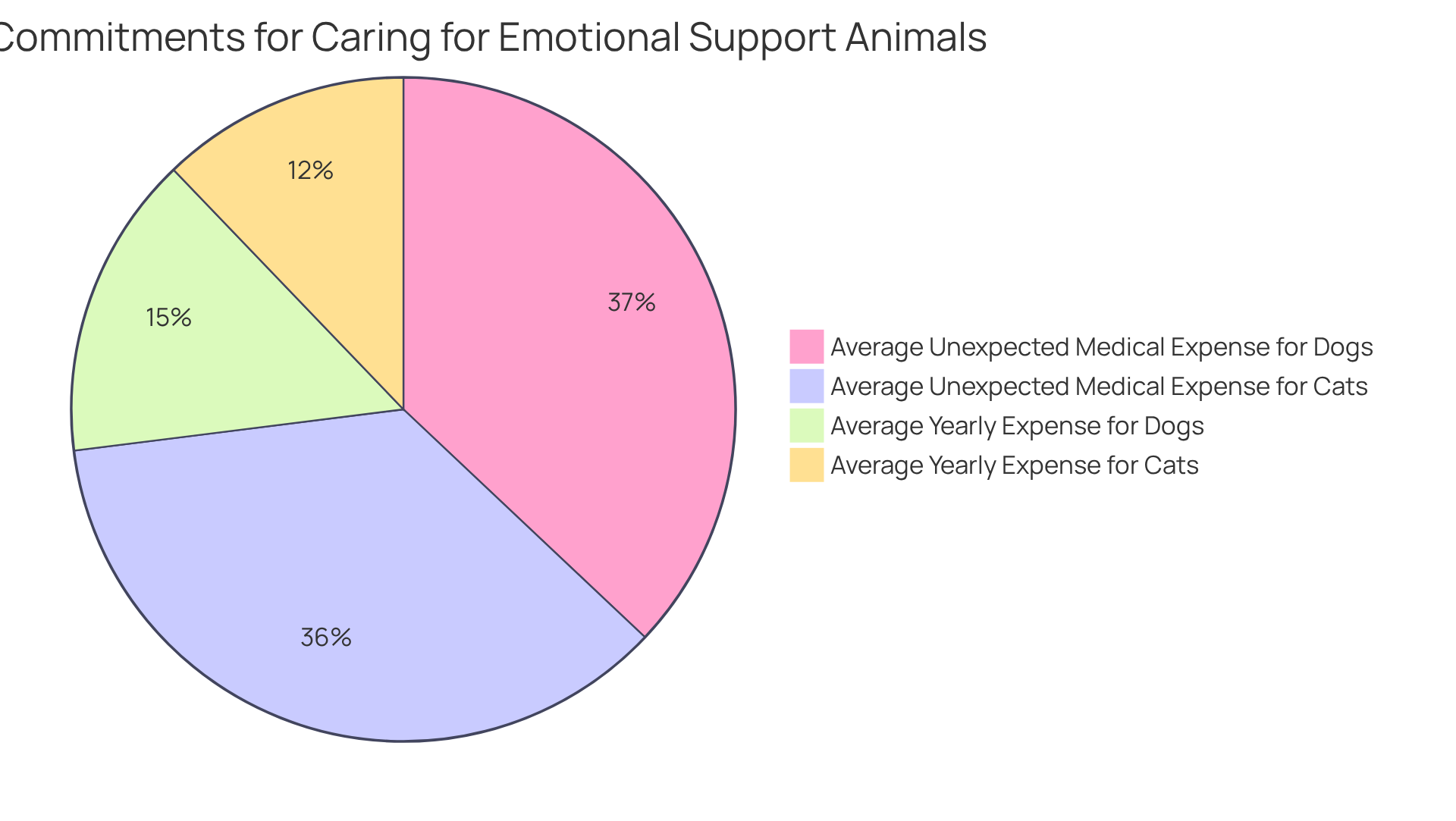
Obtaining an ESA: Steps to Secure Your Emotional Support Animal
Discover the effortless way to obtain your legitimate ESA letter with Wellness Wag. For many, securing an anxiety support animal can feel overwhelming. You may be struggling with feelings of loneliness or emotional imbalance, and the thought of navigating this process alone, without the help of an anxiety support animal, can be daunting.
Start by completing a brief evaluation with Wellness Wag. This step allows you to express your support needs, enabling us to tailor our services to your unique circumstances. After this, you will be connected with a licensed mental health professional who will conduct a personalized consultation and thorough evaluation to determine if an ESA is right for you. If deemed appropriate, the professional will issue a valid ESA letter, which is essential for accessing legal protections under the Fair Housing Act and Air Carrier Access Act for an anxiety support animal.
It’s important to note that while 18% of pet guardians in the U.S. have Emotional Support Animals, a staggering 70% are unaware of how to obtain certification for their pet as an ESA. With your ESA letter in hand, typically provided within 24 hours, you can choose an animal that aligns with your lifestyle and personal needs.
Familiarizing yourself with your rights as an anxiety support animal holder is also crucial, empowering you to advocate effectively for your needs in housing and travel situations. As Andre Gregatti beautifully states, “Anxiety support animals help people feel less lonely and more emotionally balanced.” This process not only enhances your well-being but also equips you to navigate any challenges that may arise.
Remember, you are not alone on this journey; support is available every step of the way.
Types of Animals: Choosing the Right Emotional Support Animal for You
Emotional Support Animals encompass a diverse array of species, from beloved companions like dogs and cats to more unconventional options such as rabbits, birds, and even miniature pigs. As we navigate through 2025, the landscape of ESAs continues to evolve, with around 20% of ESAs in the U.S. being non-traditional animals. This shift reflects a growing acceptance of diverse species in providing emotional support, which can be incredibly comforting for those in need.
When considering an ESA, it’s essential to reflect on factors such as the animal’s temperament, size, and your living environment. Have you thought about how these aspects may impact your daily life? Research indicates that 84% of ESA caregivers experience significant improvements in their mental well-being, while 88% report a positive effect on mental health. This underscores the importance of selecting an animal that resonates with your personal needs. A harmonious relationship with your ESA can truly enhance your well-being, making it vital to align your choice with your lifestyle.
Unconventional ESAs can offer unique benefits; for instance, rabbits can provide companionship and comfort, while birds may foster social interactions. It’s also important to consider the financial implications of maintaining an ESA, as annual costs can range between $800 and $2,000. Ultimately, the right anxiety support animal should not only fit your living situation but also positively contribute to your mental health journey, especially for working professionals managing stress and anxiety. Remember, you are not alone on this journey, and the right support is available to help you thrive.
Debunking Myths: Common Misconceptions About Emotional Support Animals
Misunderstandings surrounding Emotional Support Animals (ESAs) can create confusion for those considering becoming caregivers. Many individuals believe that ESAs require specialized training, but unlike service animals, they do not perform specific tasks. This distinction is essential, as it emphasizes that ESAs primarily offer emotional support rather than task-oriented assistance.
Another common misconception is the idea that ESAs have unrestricted access to all public spaces. In reality, their access rights are more limited compared to service animals, which benefit from protections under the Americans with Disabilities Act (ADA).
Understanding legal rights is crucial for ESA caretakers. Alarmingly, about 70% of ESA owners do not fully grasp their rights under the Fair Housing Act (FHA) and the Air Carrier Access Act (ACAA). This lack of awareness can hinder their ability to advocate for necessary accommodations in housing and travel. Mental health professionals stress the importance of educating potential ESA owners about these rights, ensuring they can successfully navigate the complexities of ESA ownership.
By dispelling these myths and clarifying the facts, individuals can make informed decisions about incorporating an ESA into their lives. This understanding ultimately enhances their mental well-being and deepens their appreciation for the support these animals provide.
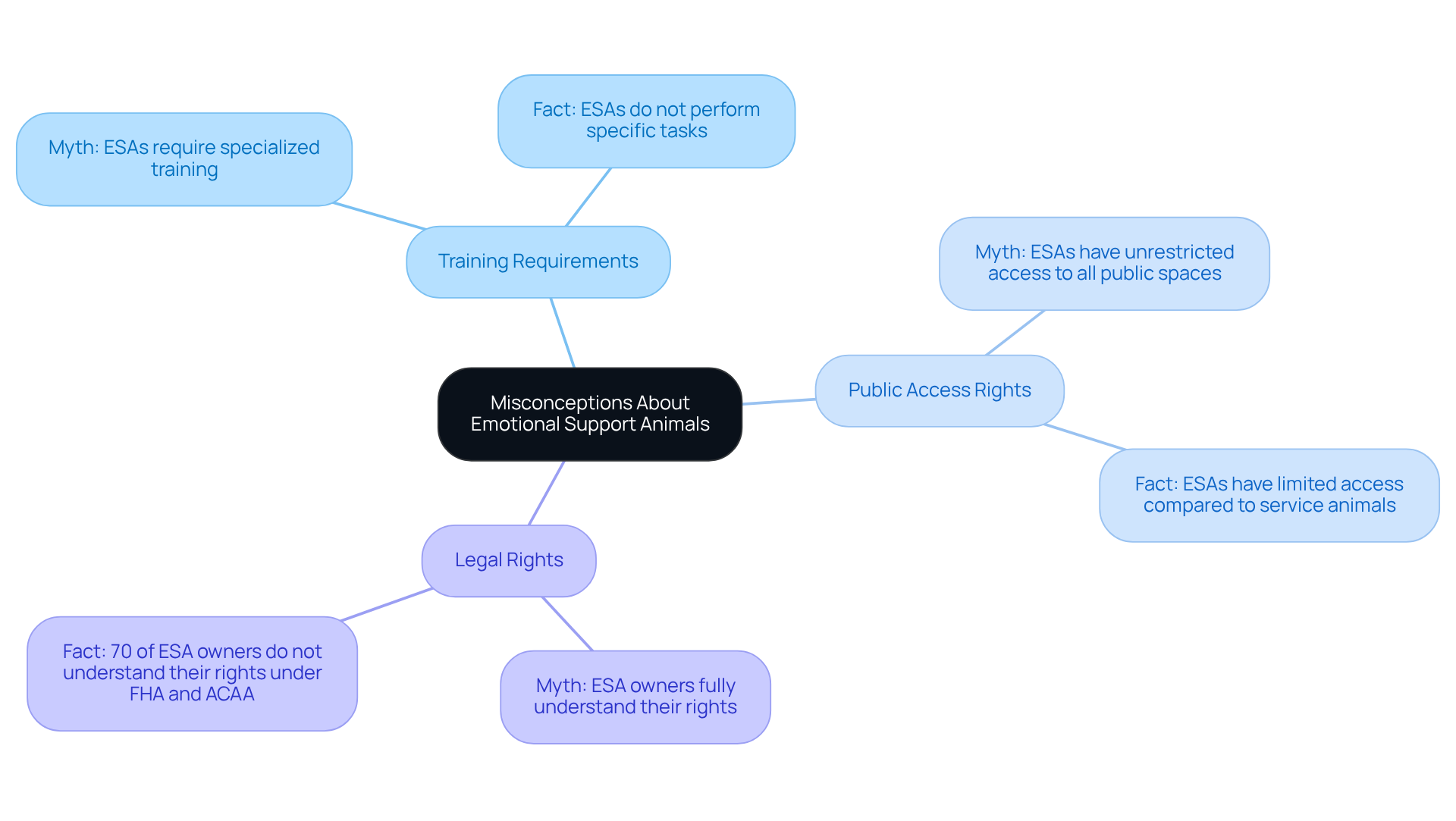
Enhanced Quality of Life: The Comprehensive Benefits of Emotional Support Animals
Anxiety support animals offer a wide array of benefits that can profoundly enhance an individual’s quality of life. Many individuals face emotional challenges such as anxiety and loneliness, and an anxiety support animal can help alleviate these overwhelming feelings. Anxiety support animals play a crucial role in alleviating these feelings, fostering companionship, and providing emotional stability. The unconditional affection and assistance from these animals can lead to significant improvements in mental health. Research indicates that 88% of ESA guardians perceive a positive effect on their well-being. During the pandemic, 62% of ESA owners reported enhanced mental health, in stark contrast to only 19% of those without an ESA. Furthermore, 41% of individuals without an ESA reported a decline in their mental health during this challenging time, underscoring the importance of having an ESA for emotional support.
The presence of an anxiety support animal can also encourage increased social interaction and instill a greater sense of purpose. For numerous people, these creatures serve not only as companions but also as vital anxiety support animals essential to their mental health journey. Research indicates that 73% of ESA owners rate their pets’ effectiveness in improving mental health at eight or higher on a scale of ten. This highlights the essential role ESAs serve in connecting mental health challenges and stability.
Real-life stories further illustrate the transformative impact of ESAs. Many individuals have shared how their support animals have assisted them in managing daily challenges, offering comfort during tough times and improving their overall quality of life. For instance, James B. noted, “I had a great experience with Wellness Wag. The approval process for my ESA was easy and hassle-free. Five stars from me!” Similarly, Linda S. expressed, “Wellness Wag made getting an Emotional Support Animal a breeze. The staff was very supportive and helpful throughout the process.” These testimonials reflect the satisfaction of clients who have benefited from Wellness Wag’s streamlined ESA letter services, ensuring a straightforward and efficient process for obtaining the necessary documentation.
As knowledge of the advantages of anxiety support animals continues to grow, more individuals are recognizing their significance in promoting mental well-being and resilience. Understanding the legal rights associated with ESAs under the Fair Housing Act can empower individuals to advocate for their needs in housing and travel situations. Wellness Wag is committed to ensuring that clients receive reliable and accessible ESA letters, providing the necessary support for those navigating emotional and mental health challenges.
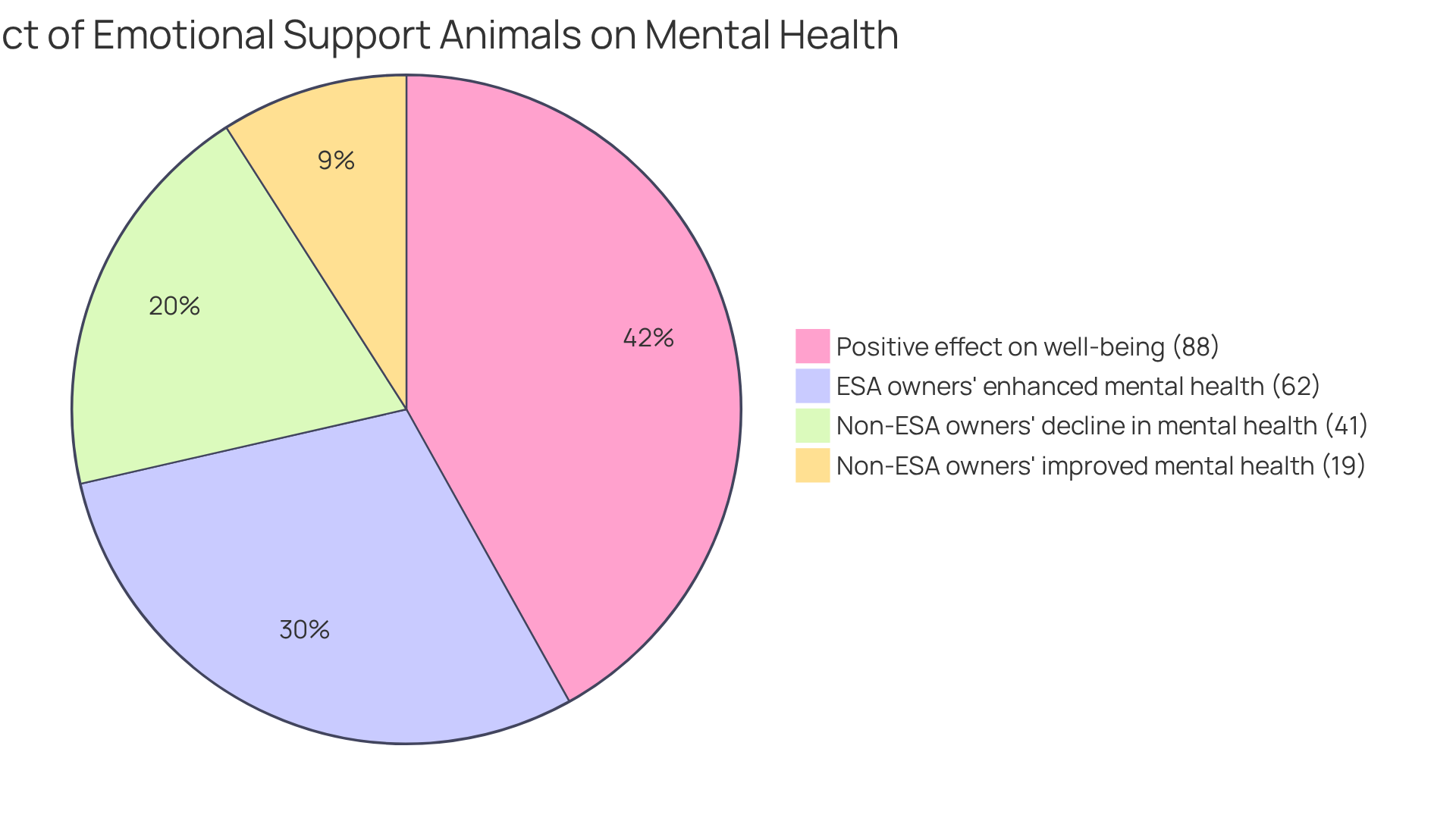
Conclusion
For individuals grappling with mental health challenges, anxiety can often feel overwhelming and isolating. The emotional toll of loneliness and distress can significantly impact one’s quality of life. However, there is hope. Emotional Support Animals (ESAs) offer a nurturing presence that can help alleviate these feelings, providing comfort, companionship, and a sense of stability. Their profound impact is supported by numerous studies and heartfelt testimonials, showcasing how they can enhance emotional well-being and improve overall life satisfaction.
The benefits of having an ESA extend beyond mere companionship. These cherished animals not only foster deep emotional connections but also come with legal protections that empower their owners. Imagine the peace of mind that comes with knowing you have the right to have your ESA by your side. From the therapeutic tasks they perform to the financial security provided by pet insurance, the multifaceted advantages of having an ESA are truly remarkable. It’s essential to understand your rights and the process of obtaining an ESA letter, as this knowledge enables you to advocate for your needs in various situations.
Recognizing the transformative power of Emotional Support Animals is crucial for anyone considering this path. Adopting an ESA is a meaningful step toward enhancing emotional stability and companionship. By embracing the support of these animals, individuals can navigate their mental health journeys with greater confidence and resilience. Ultimately, this journey can lead to a more fulfilling life, filled with hope and connection. Remember, you are not alone in this journey; support is available, and ESAs can be a vital part of your healing process.
Frequently Asked Questions
What is Wellness Wag and how does it assist individuals seeking emotional support animal letters?
Wellness Wag is a platform that helps individuals obtain anxiety support animal letters. It offers a streamlined process that includes a brief assessment to determine eligibility, followed by a consultation with licensed medical professionals. Once approved, users can receive their official ESA letter within 24 hours, facilitating access to housing and travel accommodations.
Are there any specific regulations regarding the delivery of ESA letters in certain states?
Yes, in states like Arkansas, California, Iowa, Louisiana, and Montana, the delivery of ESA letters may take up to 30 days due to specific legal requirements. Wellness Wag is committed to transparency regarding these timelines.
How does having an emotional support animal benefit mental health?
Emotional Support Animals (ESAs) help alleviate anxiety symptoms by fostering a calming environment. Research indicates that interacting with animals can lower blood pressure and heart rate. Additionally, 88% of animal caregivers report stress-relieving impacts, and individuals with secure attachments to their animals have 25% lower anxiety levels compared to those without such connections.
What legal protections do emotional support animal owners have?
ESA owners are protected under the Fair Housing Act (FHA) and the Air Carrier Access Act (ACAA), which allow them to live with their animals in housing that typically prohibits pets and to travel with them on airlines.
Why is it important for ESA holders to understand their legal rights?
Understanding legal rights is crucial for ESA holders to prevent discrimination and secure necessary accommodations. Many ESA owners are unaware of their rights, which can lead to challenges when advocating for their needs.
What should ESA caretakers do if they face discrimination?
If ESA caretakers encounter discrimination, they should seek assistance from organizations or legal professionals who can provide support and help them navigate these challenges to ensure their emotional well-being is prioritized and protected.
Certify Your Emotional Support Animal Today

Why You Can Rely on Us?
At Wellness Wag, we believe your pet deserves care rooted in both science and compassion. Each article is carefully researched, written in clear language for pet owners, and then reviewed by qualified professionals to ensure the information is evidence-based, current, and practical for real-life care. Our goal is to help you feel confident in making informed decisions about your pet’s health and well-being.
Reviewed by
Angela Morris, MSW, LCSW
Angela is a licensed clinical social worker with 20 years of experience in patient advocacy and community mental health. She has assisted numerous clients with ESA evaluations and brings a deep understanding of disability accommodations, ensuring that all information is accurate, supportive, and practical.

Written by :
Lena Park
Last Updated :
July 10, 2025












